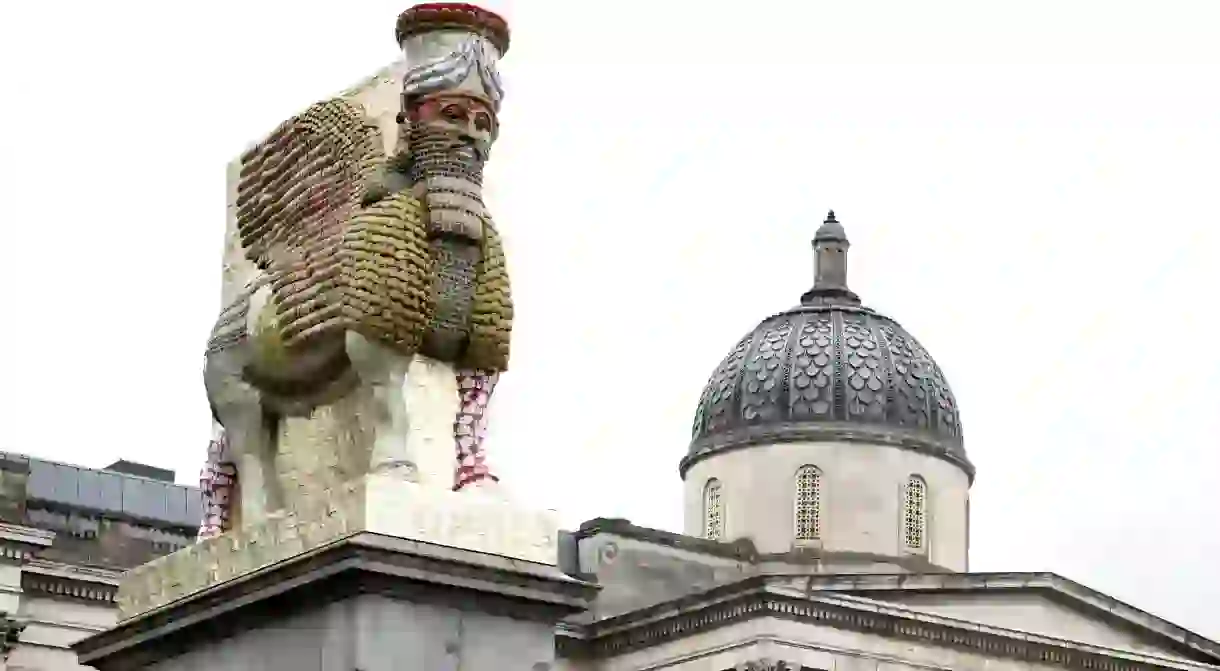Assyrian Deity Recreated Out of Iraqi Date Syrup Cans Unveiled on Fourth Plinth

The latest Fourth Plinth commission, Michael Rakowitz’s The Invisible Enemy Should Not Exist (2018) takes centre stage in the capital’s Trafalgar Square after Mayor Sadiq Khan unveiled the four and half metre-high sculpture on a typical wet London morning.
London is home to a number of public sculptures and civic monuments. And one of the most intriguing sites for contemporary art interventions has been the Fourth Plinth, a space left empty for an unrealised equestrian statue of William IV.
We’ve been waiting with anticipation since last year when the Iraqi-American artist, Michael Rakowitz’s shortlisted work was announced as the 2018 Fourth Plinth commission, the twelfth artwork since the programming began in 1998.
‘Michael’s work shows the power of art to bring to life politics, cultures and personal stories from around the world and across generations,’ said the Mayor of London on unveiling Rakowitz’s recreation of an Assyrian protective deity.

Since 2006, Rakowitz has embarked on the colossal task of bringing back to life more than 7,000 culturally important objects and artefacts that were either looted from the Iraq Museum after the 2003 US invasion or have since been destroyed at archeological sites, mostly by ISIS. The ongoing touring project, The Invisible Enemy Should Not Exist culminates drawings, sound pieces and sculptures that seek to reconstruct a lost history.
For his Fourth Plinth commission, Rakowtitz has used 10,500 empty Iraqi date syrup cans to give form to Lamassu, a winged-man-bull deity that once guarded the entrance to the Nergal Gate of Nineveh from 700 B.C before it was destroyed in 2015 by ISIS.

‘This work is unveiled in Trafalgar Square at a time when we are witnessing a massive migration of people fleeing Iraq and Syria,’ said Rakowitz. ‘I see this work as a ghost of the original, and as a placeholder for those human lives that cannot be reconstructed, that are still searching for sanctuary.’


Food is an important aspect to Rakowitz’s practice and many of the recreated artefacts from The Invisible Enemy Should Not Exist project have been made from recycled food packaging.
Here, the importance of the date syrup can lies in its representation of a once thriving industry that has dramatically declined since the Iraq Wars, as well as a cultural ritual – traditionally Iraqi parents would place a date in their newborn’s mouth so their first taste of life would be sweet, ‘a harbinger of good things to come,’ as Rakowitz puts it.
The reuse of material also echoes how the bronze relief of Nelson’s Column was made from canons salvaged from the wreck of HMS Royal George. And the fact Trafalgar Square is itself a monument to a war victory, should not be lost. This is the ideal platform for a work that speaks of ongoing cultural desecration and humanitarian crisis due to conflicts.

To coincide with the unveiling of the twelfth Fourth Plinth commission, Rakowitz has created a limited-edition artwork made from date syrup cans, source from Karbala, Iraq, as well as working with chefs, including Margot Henderson and his mother to collate new and traditional recipes that use Iraqi date syrup.
Michael Rakowitz’s The Invisible Enemy Should Not Exist will remain on the Fourth Plinth in Trafalgar Square until March 2020, when Heather Phillipson’s work will take its place.
Want to see more art in London? Here are the art events and exhibitions, we’re most excited about.













